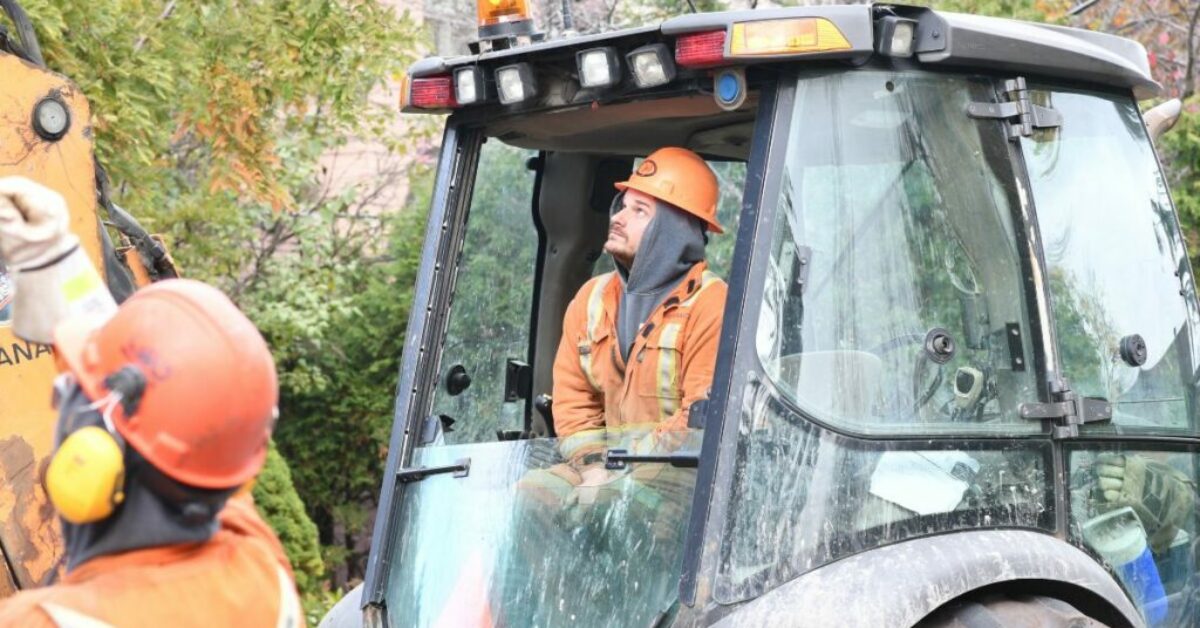How To Become A Backhoe Operator?
If you’re interested in becoming a backhoe operator, then you’re in luck! The demand for skilled operators is high, and the job can be both fulfilling and financially rewarding. In this article, we’ll discuss the steps to becoming a backhoe operator, the skills you’ll need to acquire, and the benefits of working in this field.
Steps To Becoming A Backhoe Operator
To become a Backhoe Operator you will need to follow these steps:
- Gain Education and Training
The first step to becoming a backhoe operator is to gain the necessary education and training. This can be done through vocational schools, community colleges, or training programs offered by companies that hire operators. During your training, you will learn the basics of heavy equipment operation, safety procedures, and how to maintain equipment.
It’s important to note that backhoe operators work in a variety of industries, including construction, mining, and landscaping. Each industry may require specialized knowledge and skills, so it’s important to research and choose a training program that aligns with your career goals. - Obtain a Commercial Driver’s License (CDL) and Required Certifications
Next, you’ll need to obtain a commercial driver’s license (CDL) and any other required certifications. A CDL is necessary as you will need to transport the backhoe from one job site to another. Other certifications may include OSHA, NCCCO, or any other certifications required by your employer or state regulations.
- Be in Good Physical Shape
It’s also important to note that backhoe operators work in a physically demanding environment. You’ll need to be in good physical shape and able to lift heavy equipment. It’s a good idea to start a fitness routine to build up your strength and endurance before starting your career as a backhoe operator.
- Practical Experience
After obtaining the necessary qualifications, you should start building practical experience in the field. You can do this by becoming an apprentice or helper on a job site, or by seeking out entry-level positions at construction companies or equipment rental agencies. With time, you’ll gain the skills and experience necessary to operate a backhoe independently.
As you gain experience, you may also want to consider specializing in a specific type of backhoe operation. For example, some backhoe operators specialize in excavation or demolition, while others focus on landscaping or road construction.
It’s also important to stay up-to-date with industry trends and technology. New equipment and techniques are constantly being developed, and staying ahead of the curve can help you stand out as a skilled and valuable backhoe operator.
Becoming a backhoe operator requires a combination of education, training, practical experience, and physical fitness. With dedication and hard work, you can build a successful career in this exciting and challenging field.
Skills Needed For Becoming A Backhoe Operator
As a backhoe operator, you’ll need to possess several key skills to be successful in your job. First and foremost, you must have the ability to safely operate and maintain the backhoe. This includes understanding the equipment’s controls, weight capacity, and hydraulic systems.
It’s also important to have a strong understanding of the construction industry. Familiarity with construction materials, tools, and techniques will help you to better understand the needs of the job site and work more effectively with other workers.
You should also have strong communication skills, as you’ll need to work closely with other workers on a job site. This includes being able to effectively communicate with supervisors, coworkers, and contractors to ensure that the job is completed safely and efficiently.
Additionally, you must have excellent spatial awareness and depth perception, as the job often involves operating in tight spaces and around other objects on the job site. This means being able to judge distances accurately and maneuver the backhoe with precision.
Attention to detail and problem-solving skills are also important for backhoe operators. On any given job site, there are potential hazards and obstacles that must be navigated, and you’ll need to have the ability to quickly and effectively make decisions on how to proceed. This includes being able to identify potential safety hazards and take steps to mitigate them.
Physical fitness is also important for backhoe operators. The job can be physically demanding, requiring you to sit for long periods of time and operate heavy equipment. You’ll need to be in good physical condition to perform your job effectively and avoid injury.
Finally, a strong work ethic and a commitment to safety are essential for success as a backhoe operator. You’ll need to be able to work long hours in sometimes challenging conditions, while always keeping safety as your top priority.
What is A Backhoe Operator?
A backhoe operator is a skilled professional who specializes in operating heavy equipment for construction, excavation, and demolition projects. Backhoe operators are responsible for maneuvering the backhoe to extract earth or other materials from the ground, dig trenches, or move materials around a job site.
Backhoe operators may work in a variety of settings, from residential and commercial construction sites to industrial or infrastructure development projects. As backhoes are versatile pieces of equipment, operators may also find work in other industries, such as mining or forestry.
Backhoe operators must have a strong understanding of the equipment they are operating, including its capabilities and limitations. They must also be able to read blueprints and plans to ensure that they are following the correct specifications for the job at hand.
In addition to operating the backhoe, operators may also be responsible for performing routine maintenance and repairs on the equipment. This can include checking fluid levels, replacing worn parts, and ensuring that the backhoe is in good working condition.
Backhoe operators must also prioritize safety on the job site. They must be aware of their surroundings at all times, and ensure that they are following proper safety protocols. This can include wearing personal protective equipment, such as hard hats and safety glasses, and ensuring that the backhoe is properly secured before operating it.
Overall, backhoe operators play a crucial role in the construction and development industries. They are skilled professionals who are responsible for operating heavy equipment safely and efficiently to ensure that projects are completed on time and within budget.
The Benefits of Working as A Backhoe Operator
Working as a backhoe operator can be challenging, but also rewarding. For starters, backhoe operators typically earn good salaries that can support a comfortable lifestyle. Additionally, the demand for skilled operators is high, so finding work can be relatively easy.
But there’s more to being a backhoe operator than just the financial rewards. The work is often physical, which can make for a good workout, and the job can be very fulfilling for those who enjoy working with heavy equipment and seeing the results of their efforts. Backhoe operators get to work on a variety of projects, from construction sites to landscaping, and they play a crucial role in making sure these projects are completed on time and within budget.
As they gain experience in the field, backhoe operators may also find opportunities for career advancement or specialization. For example, some operators may choose to specialize in a particular type of backhoe or in a specific industry, such as mining or oil and gas extraction. Others may choose to move into supervisory or management roles, overseeing teams of backhoe operators and other construction workers.
Of course, becoming a backhoe operator requires education, training, and experience. Most employers require at least a high school diploma or equivalent, and many also require certification or licensure. Training programs are available through vocational schools and community colleges, and some employers offer on-the-job training as well.
But for those who are dedicated to the craft, the benefits of working as a backhoe operator are numerous. With the necessary skills and qualifications, the possibilities for employment are numerous, and the job can offer a sense of pride and accomplishment. Whether you’re just starting out or you’re looking to take your career to the next level, working as a backhoe operator can be a great choice.




